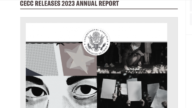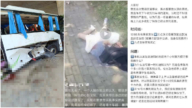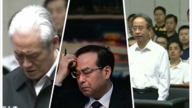【新唐人2012年3月12日讯】在中国大陆已经实行3个多月的“火车票实名制”,最近再传非议。有维权组织披露:当局利用实名制,无端阻止访民乘坐进京车辆﹔访民指控:中共推行实名制的真实目地,是为了打压异议人士、进行“维稳”。中共两会期间,北京警方不让访民乘坐公共汽车。
3月10号,大陆维权组织“权利运动”发布消息,福建访民林应强、林依银、林富萱等8人想要前往北京,在江西向塘火车站购买进京车票时,被检查身份证的警察拦截。警察声称:中央明令阻止访民进京申冤,所有往北京方向的人都要检查身份。林应强等人被迫离开车站后,多名警察突然窜出,把80岁的林依银和70岁的林富萱无端扣留。
“权利运动”质疑,当局从今年(2012年)元旦开始全面推行的“火车票实名制”,作用之一就是防止访民乘坐车辆进京。
大陆维权人士张建平认为:如果“实名制”的目地是为了保障民众安全、防止犯罪,是无可厚非的,但现在看来,“实名制”只是当局的一个“维稳”措施。
张建平:“它(实名制)主要还是针对这些维权人士、访民。就是说,你出台一个政策也好、一个法律也好,你要针对的是什么。你如果针对的是无辜,或者针对的是公民的合法行为,那么这个(政策)就有问题。”
张建平谈到,当局并没有把“实名制”用在正当途径上。
张建平:“你(中共)仅仅是为了保护你的不法利益,这肯定是一个恶法。无论它出台的内部文件也好、法律也好,包括这个实名制,如果是那样的话,实质是走了邪路了。”
《希望之声电台》曾报导指出,近年来,大陆各种社会矛盾日益激化,当局为了维稳,热衷于推行各种“实名制”来管制民众。从火车票、手机到网络微博,都要实名,而买避孕药、买菜刀需要“实名”更是让公众一片哗然。
在大陆官方的说辞中,“火车票实名制”主要是为了防止“黄牛党”倒票,而《北京晨报》的调查报导则揭示:实名制后,黄牛们和车站工作人员继续勾结,私带无票人员进站上车,黄牛们的生意变得更好了。
大陆网络作家荆楚:“火车实名制本来是一个好事,在党国呢就变成了一个坏事。因为有很多访民被记录在案,现在我们这个地方,在两会期间,如果有上访的,直接就把他捉回来,送进看守所。”
《法国国际广播电台》报导,中共两会期间,北京警方下令:不许访民乘坐公共汽车。 3月10号,上海访民徐玮、冯国伟等5人要乘坐公共汽车前往北京站,车上售票员拒绝他们乘车,并打电话报警,致使5名访民被抓。
荆楚:“这个两会本来(应该)是反映民情民意的一个会议,现在已经完全与老百姓隔离了,只是党国这些大佬们在这里排排坐、吃果果、拍拍巴掌、举举手。”
荆楚强调指出,中国的司法体制是党国化的,根本没有公正可言,因此才造成了大量访民。而中共把访民当作洪水猛兽,现在“实名制”也成了干涉老百姓自由、不允许申冤的手段,非常可悲!
新唐人记者代静 、李谦 、萧宇采访报导。
To Prevent Appeal, the CCP Reveals the Purpose of its Real-name System
China’s train ticket identification registration system
has been in implementation for over three months.
Recently, it has again been subject to criticism.
Human rights groups revealed that the Chinese Communist
Party (CCP) regime is using the “real-name system"
as an excuse to prevent petitioners from taking public
transportation to Beijing.
Petitioners said that the CCP launched the “real-name
system” in order repress dissidents and maintain stability.
During the Two Sessions (high-level internal meetings),
Beijing police stopped petitioners from taking buses.
On March 10th, Human Rights Campaign in China (HRCC)
reported that 8 petitioners in Fujian planned to appeal in Beijing.
As the 8 were buying tickets at Xiangtang Railway Station
in Jiangxi, police stopped them after checking their ID.
Police claimed that the central regime has a clear rule for
stopping petitioners from appealing in Beijing.
The ID of all passengers traveling to Beijing will be checked.
The petitioners were forced to leave the train station.
Moving very quickly, a few police detained
80-year-old Li Yiyin and 70-year-old Li Fuxuan.
HRCC questions the “real-name system"implementation
starting on new year’s day.
One of the purposes is to prevent petitioners taking public
transportation to Beijing.
Human rights activist Zhang Jianping believes that
if the “real-name system" is to secure the public’s safety and prevent crimes, then that’s acceptable.
However, from what we have seen, it is another of the CCP’s
attempts at maintaining stability.
Zhang Jianping (activist), “Real-name system is aimed
at human rights activists and petitioners.
No matter which new policy or rule, what is the purpose
behind them?
If they’re aimed at vulnerable people and at the public’s legal
rights, then there is a problem with the policies.
Zhang Jianping highlighted that the CCP didn’t use correct
channels to implement the “real-name system."
Zhang Jianping (activist), “If the policy is only for protecting
its (CCP’s) illegal interests, for sure, it is an evil rule.
No matter what internal documents are released, what new
law is launched, including ‘real-name system’, if that’s the case, it in fact, has gone an evil way.”
Sound of Hope radio reported that in recent years,
China’s social conflicts increasingly intensified.
In order to maintain the so-called “stability", the regime
focuses on various “real-name systems" to control the public,
such as requiring citizens to use their real name when
purchasing train tickets and mobile phones, as well as microblogging.
In addition, purchasing oral contraceptives and kitchen knives
requires one to use their “real-name", which has caused outcry.
The CCP’s official reasoning for citizens to use their real
name when purchasing tickets is to prevent scalpers from trading tickets on the black market.
A Beijing Morning Post newspaper survey shows that after
the “real-name system" was implemented,
collusion between scalpers and station staff are still happening.
Instead, scalper’s businesses are even more lucrative.
Writer Jing Chu, “Logically, train ticket ‘real-name system’
should be a good move, but under CCP’s control it’s bad.
Many petitioners’names are on the CCP’s black list.
In our place, during the ‘two sessions’, if anyone goes
to appeal, he will be escorted directly to a detention center."
Radio France Internationale reported that during the Two
Sessions, Beijing police ordered no petitioners be allowed to board busses.
On March 10th, five Shanghai petitioners planned to catch
a bus to Beijing station, but were denied by the bus driver.
The driver called police and police arrested the
five petitioners.
Jing Chu (activist), “The two sessions are supposed to reflect
public opinion, but it completely isolates the public.
Officials who attend the meetings just sit in rows, eat, applaud,
or raise their hands."
Jing Chu points out that China’s judicial system is
controlled by the CCP.
Lack of justice results in large numbers of petitioners and
the CCP treats them as a threat.
Now the “real-name system" has become a method of
interfering with residents’freedom, preventing them from appealing. “Very sad,"Jing Chu stressed.



























